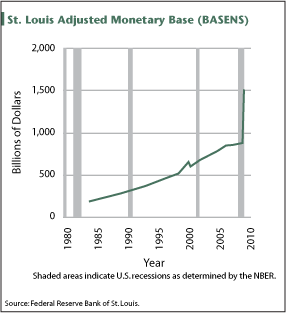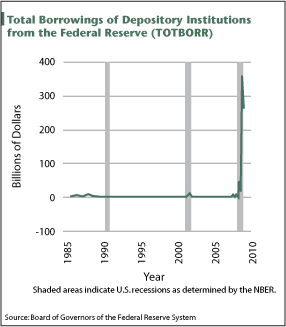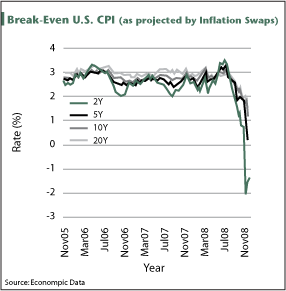Real Threat is Inflation Not Deflation
Economics / Inflation Dec 08, 2008 - 12:34 PM GMTBy: Money_Morning
 Keith Fitz-Gerald writes: We're “officially” in a recession and the panicky markets are bracing for deflation. But what most investors don't realize is that inflation – not deflation – is the real threat that they face.
Keith Fitz-Gerald writes: We're “officially” in a recession and the panicky markets are bracing for deflation. But what most investors don't realize is that inflation – not deflation – is the real threat that they face.
For more than a year now, I've been telling readers and attendees at financial conferences around the world that the United States has been in a recession since last November.
I was wrong.
But only by a month: According to the National Bureau of Economic Research (NBER) announcement last Monday, we “officially” entered into a recession last December .
Now, I realize that stocks have taken a drubbing in the past few months. And the odds are good that share prices will get beaten down further in the weeks ahead. But that's actually good news – and for three reasons:
- The NBER, which called the recession — apparently from its suite in the “Better Late Than Never” Department — is not known for being timely. In fact, its timing is so consistently bad that this latest recession pronouncement might actually be viewed as the light near the end of the tunnel. Indeed, of the four recessions since 1980, the NBER announced that we were in a recession in a (somewhat) timely fashion only once. That was in 1981, a full six months after the recession actually started. But in each of the other three recessions – 1981-1982, 1991 and 2000 – the NBER didn't officially label the deteriorating economic conditions a “recession” until the downturn was nearly over.
- In three of the past four recessions – 1980, 1991 and 2001 – the Standard & Poor's 500 Index had already reached its recessionary lows at the time the announcements were made.
- Since 1900, the average length of a U.S. recession is 14.4 months. Assuming that historical relationships hold true, the NBER data, despite the fact that it's a year late, falls in line with our suggestions of a few weeks ago that a late springtime rally may be in the works.
(Whether we believe that last point is another point entirely for reasons we've written extensively about in recent months. So we won't rehash those today.)
But we will point out something that's vitally important right now: There has not been a recession in history that wasn't followed by inflationary pressure . And that, in turn, suggests that investors would be wise to shore up their defenses now while everybody is looking the other way … at deflation.
Why?
The U.S. Federal Reserve is expanding our monetary base by more than $11 billion a day since September to nearly $1.5 trillion, which represents an increase of 79.02% since October 2007.
What they are doing is unprecedented in recorded history.
On an annualized basis, the run rate in just the last few months alone works out to more than 369.92% per year – which means the monetary base is accelerating dramatically (See accompanying chart).

According to the Federal Reserve's latest H.3 report, dated Nov. 28, bank non-borrowed reserves fell to -$362 billion, more than doubling the -$158 billion reported in September. Meanwhile, the preliminary Nov. 19 two-week figures reflect total borrowings are now $652 billion, up 11.85% over the same time period.
At the same time, total borrowings (TOTBORR) of depository institutions from the Federal Reserve have spiked dramatically, which signals still more money is working its way into the system. Note how smooth the TOTBORR chart has been historically for the last 22 years and how dramatically it's spiked as a result of the financial crisis. When I say unprecedented, this is the kind of chart I'm referring to.
And we're not done yet. In addition to all the infusions we've already mentioned, Club Fed is poised to inject another trillion dollars to bail out banks, insurance companies, Wall Street, possibly Detroit's “Big Three” automakers and just about anybody else who “needs” a handout to overcome years of inept management, financial malfeasance – and plain old greed.
 That's why – more than any other single reason – deflationary pressures that might exist in the next six months or so aren't really the enemy.
That's why – more than any other single reason – deflationary pressures that might exist in the next six months or so aren't really the enemy.
Carnegie Mellon University economist Allan H. Meltzer was much more in a recent interview with Forbes , stating that “people who say deflation is a threat are either rumormongers or ignorant.”
Added Meltzer: “They need to take a refresher course in economics.”
As much as we'd like to dismiss Meltzer's comments, we can't. At least not entirely, because interest rate swaps are currently pricing in deflationary expectations. And that speaks to something I've pointed out repeatedly: Any time the Fed squares off against the markets, the Fed loses. And it's clearly fighting a losing battle now.
That's why the bond markets are indicating deflationary expectations of 1.5% over the next two years and inflation of just over 0.0% over the next five years. Over the next 10- and 20-year periods, the markets are pricing in inflationary expectations below 2.0% respectively.

With an expanding monetary base already screaming inflation, this connotes opportunity.
The best way to capitalize on this in the long term is through Treasury Inflated Protected Securities , or TIPS. Right now they're comparatively cheap because investors have fled to straight Treasuries, preferring their immediate liquidity. But TIPs are rising nicely and are likely to rise much further and faster with the first whiff of inflation.
Speaking of which, we think there is a 50-50 chance of so-called “core inflation,” which excludes food and energy prices, rising to 4.0%. That doesn't sound all too bad, but that's 2.3% more than the recent 1.71% yield on five-year U.S. Treasuries, which means TIPS are a better bet today.
Our favorite, the iShares Lehman TIP ( TIP ), sports an attractive 8.21% yield and plenty of upside. So it's not only the good defense we've mentioned in the past, but one with plenty of inflation protection built in.
It's up 14.35% from the low of $84.14 set Oct. 10. That's something most investors are not focused on right now, but they should be.
Keith Fitz-Gerald
Investment Director
Money Morning
Money Morning/The Money Map Report
©2008 Monument Street Publishing. All Rights Reserved. Protected by copyright laws of the United States and international treaties. Any reproduction, copying, or redistribution (electronic or otherwise, including on the world wide web), of content from this website, in whole or in part, is strictly prohibited without the express written permission of Monument Street Publishing. 105 West Monument Street, Baltimore MD 21201, Email: customerservice@moneymorning.com
Disclaimer: Nothing published by Money Morning should be considered personalized investment advice. Although our employees may answer your general customer service questions, they are not licensed under securities laws to address your particular investment situation. No communication by our employees to you should be deemed as personalized investment advice. We expressly forbid our writers from having a financial interest in any security recommended to our readers. All of our employees and agents must wait 24 hours after on-line publication, or 72 hours after the mailing of printed-only publication prior to following an initial recommendation. Any investments recommended by Money Morning should be made only after consulting with your investment advisor and only after reviewing the prospectus or financial statements of the company.
Money Morning Archive |
© 2005-2022 http://www.MarketOracle.co.uk - The Market Oracle is a FREE Daily Financial Markets Analysis & Forecasting online publication.



